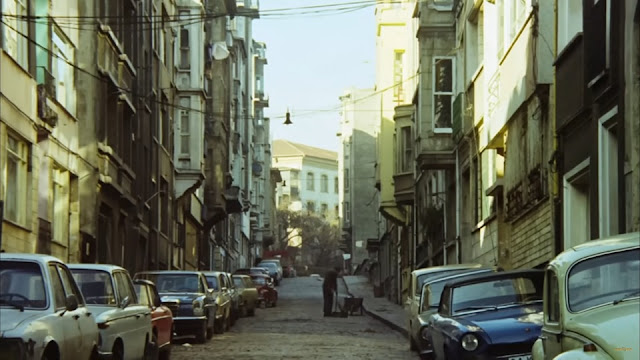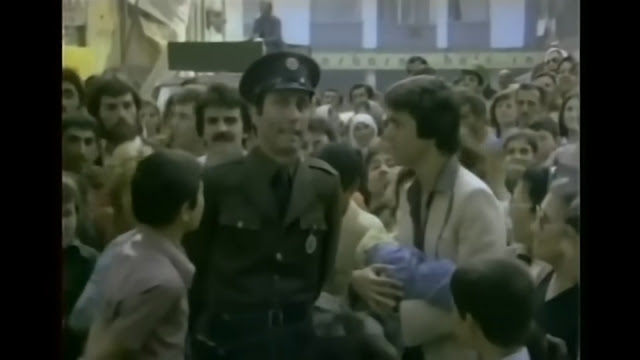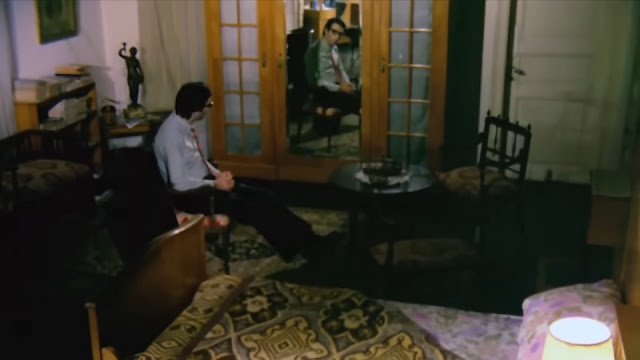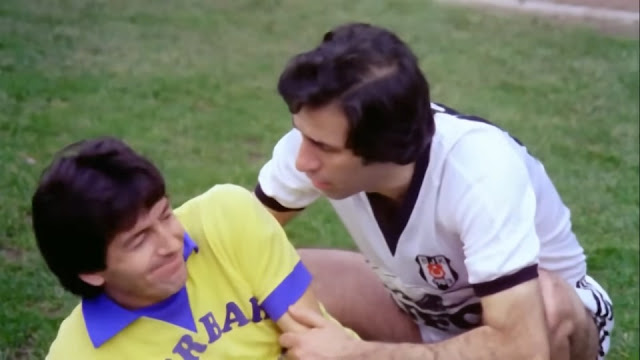2004s Turkish sci-fi G.O.R.A. is a modern comedy classic, while its sequel A.R.O.G. is generally liked though its caveman themed time travel plot felt a bit different to what everyone expected from a follow-up. It seemed like that was it, until 10 years later, when a third (and possibly final) entry to the series finally came out-Arif V 216...
Regular yet gifted Turkish dude Arif is enjoying his life and galactic-themed popularity. This reverie is broken with the arrival of alien robot 216, who announces his desire to stay on Earth for a while, and learn to be more human. His presence is immediately met with hostility by paranoid officials, who give chase. Arif gets them out of hot water with his time machine, taking them to 1969 Istanbul. Arif's protests that they not stay fall to the wayside when 216 falls in love with an innocent blind girl. He feels the whole reason he came to Earth is right here. A rift soon grows between the friends, exacerbated by a greedy toy manufacturer. An accidental trip back to the present shows a horribly distorted timeline where 216 rules as an absolute dictator, and Arif's work is cut out for him if he's gonna repair their friendship and the timeline...
Arif V 216 is a = time to say the least. Many fans were hoping for a return to the source, with another Goran adventure. On one hand that'd be good, since A.R.O.G. was a detour, and that setting is what people really enjoyed. On the other hand swinging back to the original setting for the 3rd entry would leave the 2nd as the odd one out! What Arif V 216 does is a mix of both. It returns to some elements from the 1st film, though only characters, not the setting. Instead the focus of this 3rd entry is...Yeşilçam cinema! Turkey's golden age of movies.
The story here opens with a nice montage of Arif's past exploits, and acquired fame. Despite this he's still slumming it as a cheap hawker. This is despite being happily married, and a father now, but for some reason they stay on planet Gora and he's at his own pad on Earth. The arrival of alien robot 216 spices things up quickly. [Despite idolising a guy famous for visiting other planets, the whole neighbourhood suddenly become alien racist, leading to a quick getaway.
Time travel to the past sees the world turn to black-and-white, like an old movie, which is silly in either a fun way or just
plain dumb. Considering we've seen time travel in this series before and
it didn't happen I'd go with dumb, but it's a harmless joke. And it
leads to a great sequence when the blind girl is rescued by 216 from an
oncoming car, and colour returns to the world as he cradles her
The Yeşilçam tribute here was mixed for me. As a big fan of those movies I was on board, especially as someone who wants to write my own homages! I wasn't much a fan of how it was done though. It feels like the movie's constantly namedropping, or having as many references as it can, with all the subtlety of a hammer to the face. If you're familiar with this stuff you might be amused by some of it, or just be annoyed. If you're not familiar, then you'll have no idea what this word salad of a film is on about!
One mild criticism I've read for this film is that it's too loving towards the old Yeşilçam films, and never really roasts them. On one hand I get this point, but on the other this is meant to be a tribute. And coming down harshly on those films could be mean spirited, when all they ever were was good-hearted innocent entertainment.
It's been so long since the original G.O.R.A., itself beloved by the Turkish public, that the film has nostalgia for itself. Some of this is also just namedropping, while other bits are nice. There's a youthful cameo near the end that I was simultaneously annoyed by, but also slightly appreciating
Arif V 216 is a densely packed movie, and this makes it feel slow at times, especially with the punishing 2 hour runtime. Things start picking up by the hour mark, when the plot finally stops being a GG and real stakes occur. Suddenly Arif and co must prevent a nightmarish vision of the future from coming to pass! This means, however, going back to the past. The film slows down again, with yet more references. At points I had no idea what was happening or why. Although the use of the blind cure trope (usually for pretty young maidens) for established old coot Garavel is genius!
Near the end I was begging for it to just be over. My ideal for this film would've been to cut it down to 90 minutes, divide past and future a little more
evenly, and not hammer in the Yeşilçam tropes so constantly. That subtlety would be appreciated!
Thankfully things pick up again for the finale. There's a plane chase, with swinging music. It felt fun in an Austin Powers style way, and things get a fun resolution, not to mention entirely ridiculous (in a good way!). Arif gets a nice speech as farewell to everyone in the 60s, and the movie hits what'd be a sudden but effective end point. But then it keeps going! With yet more actor references (this time though with the real deal). There was a meta ending joke that didn't amuse me, but other bits I did like.
Arif V 216 is a funny movie, though not all the comedy worked for me. Some is a bit flimsy, other bits I just didn't find that funny. But there was enough to make it worth more than a few chuckles. Some gags I liked were =, =, and the sudden costume changes. On the other side, there are recurring comments about the Germans that I never got. The film also seems to
have it in for Zeki Müren! Although I don't think this was
genuinely meant as an attack, and he ends up helping the heroes in the end.
There are plenty of characters here to keep track of. Arif is his usual self. A bit scuzzy and uncouth, but generally good at heart. His friendship with 216 is well-rounded, with highs and lows. In some ways he doesn't treat him the best, but in others he really goes to the bat. The only element to Arif I didn't like this time round was his complete abandonment of his family! It's glossed over entirely, as if the writers just wanted an excuse to have him by himself.
216 is a likeable sidekick. A big fan of old movies, and a hopeless romantic, this causes trouble, especially when he falls in with the wrong crowd. We see plenty of his personality here, from his hopes to his anxieties. He never comes across too unlikeable ,for the most part. Also, in the first movie he felt gay coded, but not here. Dunno if that's a regression, but his romance here feels natural enough.
The supporting cast are fine. Pembeşeker (or Alev, as it turns out, because of course!) is just cute at first. There's a twist regarding her character and friends, which at first flummoxed me, but pretty soon I felt it had its place. And it allowed for richer characterisation for her too. She may not really love 216 exactly, but she still cares for him, enough to sway him back to good. For his own sake as well as preventing the apocalypse. And she rightfully banks on reciprocating but saying he has to return to his home time. Overall she's a smart character, and figures things out quickly.
The villains are good. Just the right mix of scummy, but lighthearted and almost harmless. Though I wish some of them got more to do (like the femme fatale). Evil alternate 216 is a great genuine antagonist, but never appears again after his first scene.
A few Yeşilçam stars show up as characters, and are generally treated like the most awesome people around. This could feel like ego stroking, but having different actors play them helps remedy/prevent this. The highlight for me was the fight scene with Ayhan Işık!
The cast here does a fun job, though may not be to everyone's taste. Leading man Cem Yılmaz most exemplifies this. He's a bit much at times, but does well, and gets across the character's likeable side. Ozan Güven is a strong co-star, getting plenty of material to chew on here! From optimism, to pathos/tragedy, and a bit of evil too! According to Wikipedia he also plays Barış Manço which I kept an eye out for the whole time, but never saw. Yılmaz meanwhile pulls double duty as Erşan Kuneri, in an dd musical aside. Seda Bakan is gorgeous and bubbly, making for a good sidekick! Almost enough for me to miss the presence of Özge Özberk, who gets all of two or three cameos and that's it. Özkan Uğur returns to the series, doing a fun job as Garavel, getting to ham it up.
One thing to note is that Yeşilçam actors/people spoke in a different dialect to modern Turks. Whether or not it's reproduced here I can't say. Since I'm English I can't actually tell the
difference. Which says one thing...When I speak in Turkish I probably
sound like a walking time machine!
The effects here are a high point! 216 is convincingly robot-y enough, while still giving the actor plenty of movement. There are also some neat CGI landscapes in the bad future scenes, which reminded me of Lexx. Then there's how well the movie recreates 1960s era Turkey. It's fun, colourful, and I liked all the little tributes too, like the Kilink and Tarkan posters in the background. The wild costumes are funny, though some verge on just plain silly (perhaps that's Zeki Müren's fault)
The direction in general is very good, with some neat shots, and choreography. The black-and-white stuff is well-shot too, particularly how the colour seeps in.
There's a fun score here, with good sci-fi beats and comedy tracks. There are plenty of songs too, and they're mostly neat (I even found the electro hip-hop one not too intolerable). One observation though is they didn't really sound classical, like an actual period song by, say, Şenay. Maybe I just don't have a good enough ear for Turkish music though. Also, Cem Yılmaz gets to not only sing with an obviously fake voice, and a jokey bad one, but sings with his own voice in a way that keeps his unique sound while actually sounding good!
Overall, Arif V 216 is a good movie, but not great I felt. It's worth watching for fans of the series, but if you're new to Turkish cinema you may want to avoid this for now. It's at least to be appreciated for taking the series is yet another new direction. As for the future, Yılmaz has come out with a follow-up TV spinoff focusing on bit player Erşan Kuneri. I've no idea why when he was in all of one scene in G.O.R.A., nearly 20 years ago, but I guess he has a soft spot for the character, especially after his return here. As for Arif V 216, if this is to be a finale to the series proper, it's a good note to end on...





















































